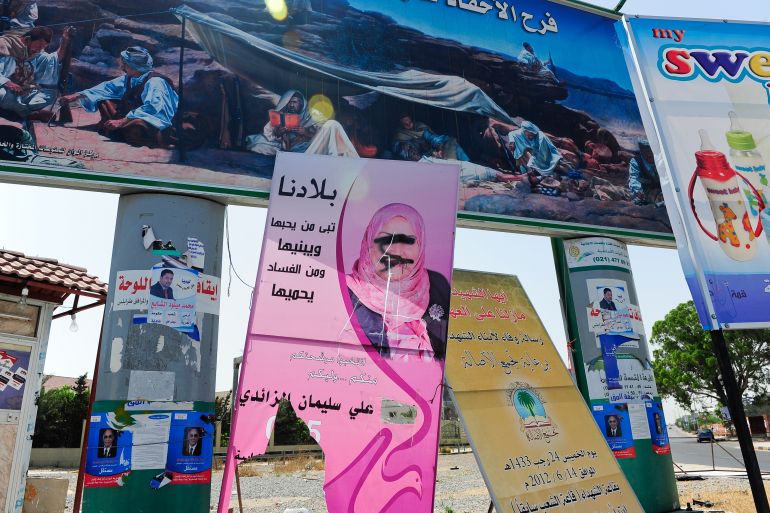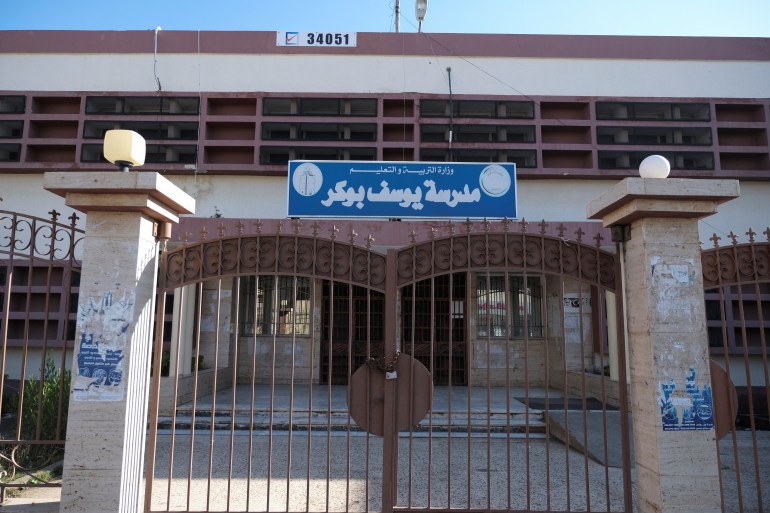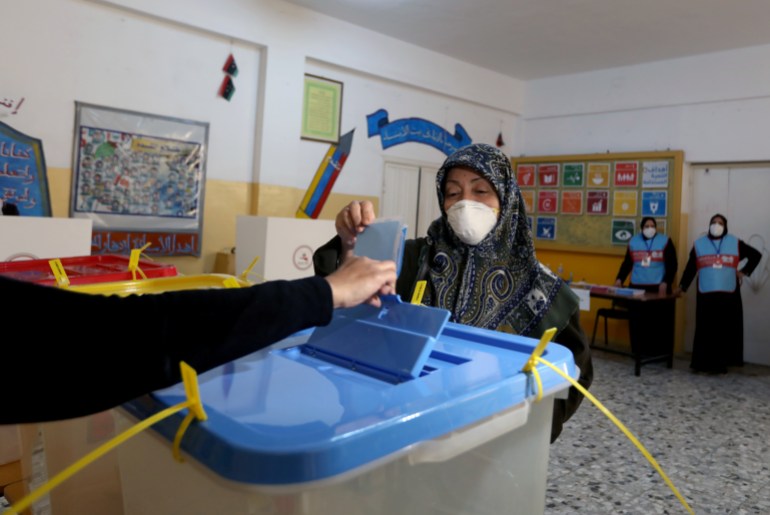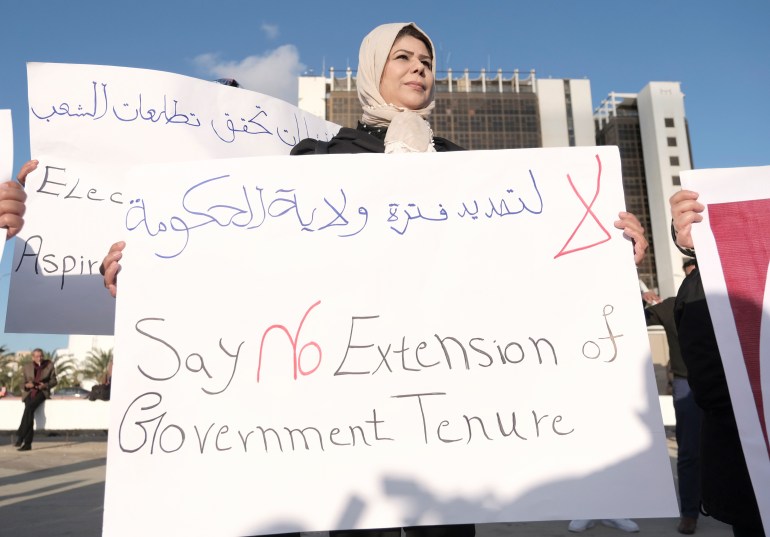‘Too terrified to leave the house’: Internet trolls in Libya target women
From death threats to smear campaigns, Libyan women working for change are being silenced online.

When parliamentary and presidential elections were announced in Libya for December 2021, prominent political activist Hanan al-Faidy, 46, immediately registered her candidacy for parliament in Benghazi.
With only six weeks between the announcement and the elections themselves, she hoped to be a part of what she dreamed would be a seismic change for war-torn Libyan society which could bring an end to the fighting and divisions.
But, almost as quickly, she was forced to withdraw on November 20 – just a few weeks before the December 24 election date – following a highly toxic online campaign against her.
“I became the subject of a vicious cyberattack that wrecked my life,” she told Al Jazeera. “I was insulted and defamed, in addition to rumours spreading about my assassination. This distressed my family immensely. All I wanted was to put an end to my children’s suffering, so I quit the race.”
Fake news reports had circulated on social media platforms claiming that al-Faidy had been shot dead while driving her car in Benghazi, while others claimed that her torched corpse had been found in a venue of “questionable reputation”.
“I was showered with calls and concern from my family near and far, fearing for my safety,” she said. “My husband and children were terrified that this news was a precursor for an actual attack on me by militants, criminals or some other entity. I was scared for my life. I didn’t want my children to go through this,” she said.
In the end, the presidential and parliamentary elections, which had been marred by disagreements over rules and regulations, as well as disputes over what powers the new president might have and who should be allowed to run, were postponed just two days before they were due to take place. Two years down the line, elections have still not taken place.
What had become clear to al-Faidy from this experience, however, was that any woman daring to put herself forward in the move to forge a brighter future for Libya would risk an intolerable backlash mounted primarily by online trolls.

Women – not welcome here
In Libya, discriminatory legal, social, economic and political structures have long left many women feeling like second-class citizens.
Well before the 2011 “Arab Spring” revolution which eventually toppled long-term dictator Muammar Gaddafi, and through the unrest which ensued and divided the country between feuding governments in 2014, women’s political representation has been limited and their empowerment overlooked.
Now, cyberattacks have emerged as an additional form of violence against Libyan women, limiting their role in society and preventing them from participating in the drive to build a new society.
Benghazi, Libya’s second-largest city and home to the self-styled eastern government led by former army general Khalifa Haftar and supported by Egypt and the United Arab Emirates, is no different from the rest of the country.
Although a few women have managed to reach high-profile positions in the public and private sectors, Libyan women remain largely marginalised in the political sphere. The extent of their contribution to public life is determined by tribal influence, which frequently puts men into positions of power first, no matter how qualified women candidates may be. Indeed, of the 98 candidates who put their names forward for the presidential elections in 2021, only two were women.
Women calling for change are often ignored, harassed and sometimes even killed by extremists. More frequently, they are also finding that their phones and laptops are being used as weapons against them – from smear campaigns on social media to hacking attacks.
Such harassment includes the tarnishing of women’s reputations and the spreading of false claims about their personal lives, which in Libya’s largely conservative society can result in significant damage to a woman’s career and life choices.
For al-Faidy, this online campaign against women appears to have been at least partially successful. Two years ago, as a result of the overwhelming harassment she received during her short-lived campaign, she shut down all but one of her social media accounts, which she now uses privately and just to stay in touch with friends and family.

Digital attacks and hate speech
In 2021, the High National Election Commission (HNEC) of Libya launched a project dedicated to tracking gender-based hate activities online. It found that an overwhelming number of women had suffered a similar fate online.
According to its findings, 76 percent of Libyan women had faced some form of online harassment, including blackmail, defamation and obscene messages, while nearly 54 percent of female officials in the country had faced similar attacks online.
HNEC’s findings also showed that 17 percent of female activists and influencers had experienced digital attacks, accusations of blasphemy and hate speech.
Salima al-Fakhri, a women’s rights defender and former chair of the Libyan Women and Youth Empowerment Forum, described such digital campaigns as “gender-based violence targeting Libya’s women”.
“It hinders efforts that aim to empower women politically and economically as it tarnishes victims’ images, shaking people’s faith in them,” al-Fakhri said.
Al-Fakhri said Libyan society and its institutions are to blame. “Society (places) all the blame and guilt on women facing such violence since it’s [Libyan] society’s view that women have no place in the digital world.”
Silencing women
Another victim of online trolls is Enas Ali, a 29-year-old English teacher from al-Rujban in western Libya, whose social media posts calling for gender equality in Libya were being followed by thousands of social media users. She, too, has been forced to step back by relentless attacks from online trolls.
“They are ongoing, systematic and worsen after each call in defence of women’s rights,” she said.
One post she published three months ago unleashed a particularly fierce digital attack.
“I posted about women’s rights in Libya and called for an end to all the discrimination we face.
“I was met with a tsunami of insults, defamation and a systematic tarnishing of my reputation online. There were also threats of abduction and assassination by extremist militias. I was shaken to the core and wasn’t able to go about my daily life,” she recalled.

In an even more extreme case, the TV presenter and influencer, Nesma al-Sherif, fled Libya for Cairo in July 2022 fearing for her life following a vicious online campaign against her. Criticism of some of the country’s militias had been falsely attributed to her, triggering a deluge of online hatred. Al-Sherif was forced to remain in Cairo for several months before she dared to return to Libya, but says she still feels very insecure in her home country.
“I was threatened with murder and was terrified of leaving my house. My reputation as a professional TV presenter was ruined and I lost my job. There were times when I’d come off air in tears from panic.”
With the help of the Libyan authorities, al-Sherif managed to shut down most of the fake accounts targeting her. However, no one has yet been detained for their part in the campaign.
The damage was done. Acutely aware that militias had previously killed several Libyan women known for taking a stance against extremism, the campaign shattered her mental health, she said.
Tackling the problem
The eastern government in Libya claims it has taken steps to stop online harassment. But human rights groups say the 2022 Anti-Cybercrime law, passed by Libya’s House of Representatives, was really an attempt to silence opposition and stifle freedom of speech. They say it does little to address the safety of women online.
According to Asmaa al-Sa’eety, an expert in digital security, the absence of specialised police units with the power to track down online criminals means perpetrators are not apprehended. “[This] allows such crimes to continue, and [those carrying them out] to get away with their actions, increasing the stakes for women,” she said.
Three officials at the Ministry of Interior in Benghazi declined to comment when approached by Al Jazeera.
Efforts to help women remain safe online are continuing at the grassroots level, however. Having been trained by the HNEC on countering cyber violence, al-Sa’eety said she has helped more than 100 women in rural areas who have fallen victim to online fraud.
“Through the platform I founded in 2022, Be Safe, I teach women – who are easier victims of scams because of their limited digital knowledge – to detect online cons and counter them,” she said.
Nuazi, another non-governmental organisation, held workshops in 2023 for more than 150 women including academics, civil workers and media personnel on cyber security.
Its chairwoman, Hanan Bushousha, said these workshops focused on legal and technical tips to combat cyber-violence, instructions on how to collect digital evidence of harassment and cybercrime and knowledge of the security risks when using social media.
“Awareness campaigns are held in Benghazi, Sirte, Tripoli, al-Kafrah, Tobruk, al-Marj, but this isn’t enough. We need the law to be enforced,” Bushousha said.
Although the elections failed to take place in 2021, and politicians’ squabbling has prevented them from taking place since, HNEC has also been holding anti-cyber violence workshops for women, particularly those working for NGOs, civil workers and security officials.
“We are doing all that we can: confronting cyber-violence against women politicians by equipping them with knowledge,” said the head of the awareness unit at HNEC, Abdulmonem al-Mariemi. “However, without enforcing laws and punitive measures, such crimes will continue.”
This article was published in collaboration with Egab.